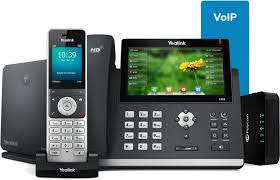Tips For Choosing A Business Telephone System
After the pandemic, the working styles of offices have changed a lot. Some are still supporting work from home features, while some offices have called the employees back to the office building. Few offices have smartly adapted to the hybrid working culture. With this mixture, phone services have been shifted to cloud-based networks. All they need is good internet connectivity and they can make all sorts of calls including incoming, outgoing, conference calls or team call sessions. This type of service is called VOIP, which is short for Voice Over Internet Protocol. VOIP telephone systems offer multiple benefits to enhance your communication and data exchange to improve information exchange with your end users. Let’s have a look at important features that must be considered while selecting a telephone system for your company:
● Reliability: A downtime can have an adverse
impact on business. A few hours or even minutes of systems not working due to
any reasons can have a very bad impact on customers as well as stressful for
employees. To avoid these kinds of scenarios, it's best to have stable networks
which are provided by reliable brands. Check thoroughly what all features are
provided by the service company you chose.
● Ease of Installation: Any office that plans to
have a system upgradation, wants it to be installed fast. No office would want
to get their working days wasted when a new setup is being installed. Always
check with the service-providing company about the time taken to install their
system, and no heavy training modules are needed to make the staff
knowledgeable about the new stuff. Telephone data cabling systems should be easy to establish, and
have an effortless learning system so that there isn’t a long time for the
whole team to understand and operate with it.
● Expense: Before finalizing the deal with the
service company, have a thorough calculation of the short as well as long-term
costing of the phone system upgradation. Check if there are any hidden costs
which can be billed at the end of the installation. See if their plans have
benefits as per your work, like unlimited VOIP calling, video calling quality
and hours, and phone bills per employee’s calling usage.
● Mobile Adaptability: The time for wired old
phones is long gone, and most companies are switching to new models. So,
switching from the old setup to tablets, mobile phones and laptops is the right
call. This will allow employees the flexibility to work from anywhere and not
sit around the physical phones all day.
● Voicemails for Queries: Just like personal phones have a voicemail system to record unattended calls, you can get the same feature for recording customer calls so that they won’t stay waiting for long. So customers who can’t spare time to wait, or who have a long waiting list on calls, can record their messages and send you, and the system will show them in your inbox just like unread emails. The recordings are stored in the system till your employees respond to those queries which can be done from anywhere with a remote system login. All these calls recordings can be archived to be used for training purposes later.



Comments
Post a Comment